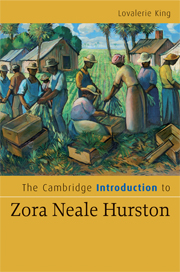2 - Contexts
Published online by Cambridge University Press: 05 June 2012
Summary
This chapter examines historical, social, political, and cultural contexts for Zora Neale Hurston's life and work, from 1891 to 1960; some attention to the thirty-year period immediately preceding Hurston's birth is also important, for it encompasses one of the most turbulent and transformative periods in United States history: the Civil War (1861–1865) and its aftermath. Only twenty-six years separates the abolishment of chattel slavery in 1865 and the year of Hurston's birth. During that time-frame, the climate for most African Americans changed from great optimism during Radical Reconstruction, to feelings of betrayal and disillusionment by century's end.
During the Civil War, enslaved persons escaped by taking refuge with Union troops; they were subsequently labeled “contraband.” Contraband relief organizations, such as Elizabeth Keckley's Contraband Relief Association based in Washington, DC, provided temporary assistance to these and other newly freedpersons who were, as one might expect, typically homeless and without basic means of support. On March 3, 1865, Congress established the Freedmen's Bureau (Bureau of Freedmen, Refugees, and Abandoned Lands) in an effort to deal more comprehensively with the post-War and post-slavery chaos. The agency, which operated under the auspices of the War Department, functioned in a variety of ways to help freedpersons: it assisted in the establishment of schools and churches; it heard cases concerning labor disputes and criminal acts committed against African Americans; and it served as a clearinghouse for information that could assist in reuniting families.
- Type
- Chapter
- Information
- The Cambridge Introduction to Zora Neale Hurston , pp. 14 - 35Publisher: Cambridge University PressPrint publication year: 2008

